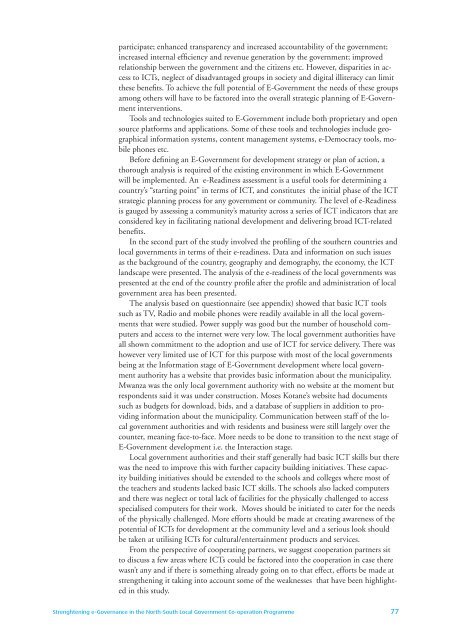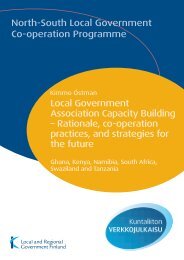E-READINESS QUESTIONNAIRE FOR NORTH ... - Kunnat.net
E-READINESS QUESTIONNAIRE FOR NORTH ... - Kunnat.net
E-READINESS QUESTIONNAIRE FOR NORTH ... - Kunnat.net
Create successful ePaper yourself
Turn your PDF publications into a flip-book with our unique Google optimized e-Paper software.
participate; enhanced transparency and increased accountability of the government;<br />
increased internal effi ciency and revenue generation by the government; improved<br />
relationship between the government and the citizens etc. However, disparities in access<br />
to ICTs, neglect of disadvantaged groups in society and digital illiteracy can limit<br />
these benefi ts. To achieve the full potential of E-Government the needs of these groups<br />
among others will have to be factored into the overall strategic planning of E-Government<br />
interventions.<br />
Tools and technologies suited to E-Government include both proprietary and open<br />
source platforms and applications. Some of these tools and technologies include geographical<br />
information systems, content management systems, e-Democracy tools, mobile<br />
phones etc.<br />
Before defi ning an E-Government for development strategy or plan of action, a<br />
thorough analysis is required of the existing environment in which E-Government<br />
will be implemented. An e-Readiness assessment is a useful tools for determining a<br />
country’s “starting point” in terms of ICT, and constitutes the initial phase of the ICT<br />
strategic planning process for any government or community. The level of e-Readiness<br />
is gauged by assessing a community’s maturity across a series of ICT indicators that are<br />
considered key in facilitating national development and delivering broad ICT-related<br />
benefi ts.<br />
In the second part of the study involved the profi ling of the southern countries and<br />
local governments in terms of their e-readiness. Data and information on such issues<br />
as the background of the country, geography and demography, the economy, the ICT<br />
landscape were presented. The analysis of the e-readiness of the local governments was<br />
presented at the end of the country profi le after the profi le and administration of local<br />
government area has been presented.<br />
The analysis based on questionnaire (see appendix) showed that basic ICT tools<br />
such as TV, Radio and mobile phones were readily available in all the local governments<br />
that were studied. Power supply was good but the number of household computers<br />
and access to the inter<strong>net</strong> were very low. The local government authorities have<br />
all shown commitment to the adoption and use of ICT for service delivery. There was<br />
however very limited use of ICT for this purpose with most of the local governments<br />
being at the Information stage of E-Government development where local government<br />
authority has a website that provides basic information about the municipality.<br />
Mwanza was the only local government authority with no website at the moment but<br />
respondents said it was under construction. Moses Kotane’s website had documents<br />
such as budgets for download, bids, and a database of suppliers in addition to providing<br />
information about the municipality. Communication between staff of the local<br />
government authorities and with residents and business were still largely over the<br />
counter, meaning face-to-face. More needs to be done to transition to the next stage of<br />
E-Government development i.e. the Interaction stage.<br />
Local government authorities and their staff generally had basic ICT skills but there<br />
was the need to improve this with further capacity building initiatives. These capacity<br />
building initiatives should be extended to the schools and colleges where most of<br />
the teachers and students lacked basic ICT skills. The schools also lacked computers<br />
and there was neglect or total lack of facilities for the physically challenged to access<br />
specialised computers for their work. Moves should be initiated to cater for the needs<br />
of the physically challenged. More efforts should be made at creating awareness of the<br />
potential of ICTs for development at the community level and a serious look should<br />
be taken at utilising ICTs for cultural/entertainment products and services.<br />
From the perspective of cooperating partners, we suggest cooperation partners sit<br />
to discuss a few areas where ICTs could be factored into the cooperation in case there<br />
wasn’t any and if there is something already going on to that effect, efforts be made at<br />
strengthening it taking into account some of the weaknesses that have been highlighted<br />
in this study.<br />
Strenghtening e-Governance in the North-South Local Government Co-operation Programme 77




